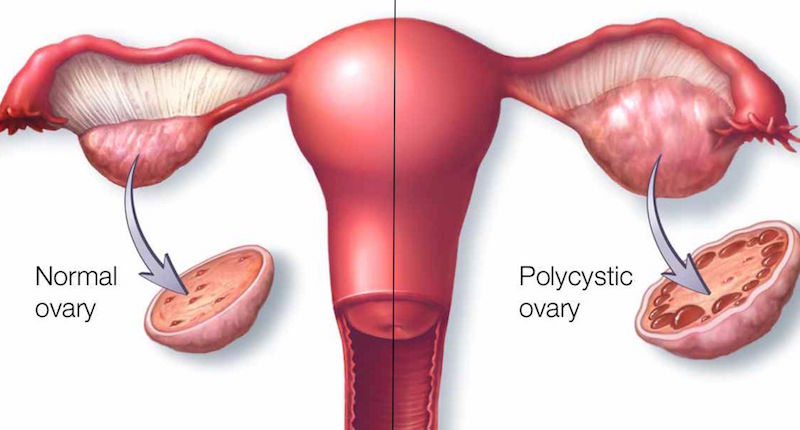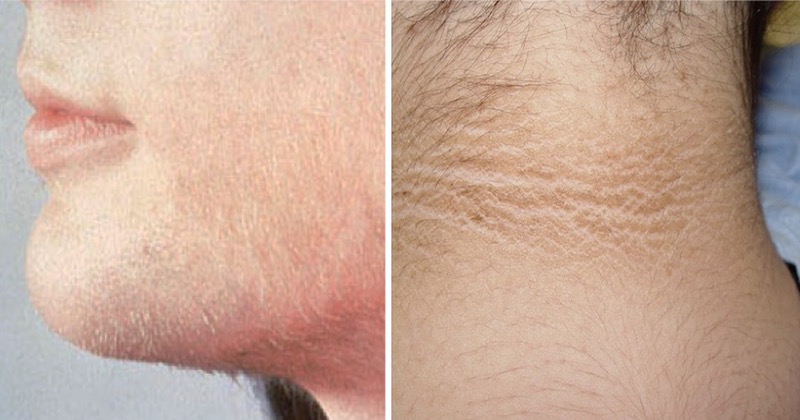Natural Remedies For PCOS To Rebalance Your Hormones
Last updated on
Polycystic Ovarian Syndrome (PCOS) is a common hormonal imbalance condition affecting about 5 to 20 percent of women of childbearing age.
The term “polycystic” means that a woman’s ovaries have multiple (poly) small cysts on them. These cysts are not harmful (benign) but lead to an imbalance of the sex hormones estrogen and progesterone. PCOS can affect a woman’s menstrual cycle, fertility and appearance.
Despite what the name implies, however, not all women with PCOS have visible ovarian cysts.
Causes of this condition may be genetics, environmental factors or a faulty diet and prolonged stress. There is an abnormally high level of male sex hormones androgens, compared to female hormones (called hyperandrogenism). High levels of male sex hormones prevent the ovaries from releasing an egg each month, thus causing irregular menstruation and infertility.
Symptoms of PCOS
Many women are not properly diagnosed as the symptoms closely mimic those of other hormonal disorders such as thyroid disorders and chronic fatigue syndrome.
PCOS symptoms can vary from woman to woman. Common and most frequently found symptoms of PCOS include:
- Irregular periods—menstrual intervals longer than 35 days, with fewer than eight menstrual cycles a year
- Excess androgen (male sex hormones)
- Polycystic ovaries—enlarged ovaries that may contain numerous small fluid-filled sacs that surround the eggs. Despite the name, some women don’t have a single ovarian cyst.
- Infertility or difficulty conceiving due to lack of ovulation
- Insulin resistance—may be related to an increased risk for type 2 diabetes
- Fatigue
- Weight gain or difficulty losing weight
- Unwanted facial and chin hair growth
- Patches of darkened skin on the back of neck, underarms, between breasts and in the groin area (called Acanthosis Nigricans)
- Thinning of hair
- Mood swings
- Acne or skin tags
- Sleep apnea and insomnia
- Pelvic pain
- Headaches
Most doctors usually prescribe birth control pills that are hormone-based to help regulate menstrual cycles. Although it may help to induce menstruation, they really don’t solve any problems but rather just masking the symptoms.
In fact, birth control pills are damaging to the liver and can cause more side effects to one’s health! These pills continuously raises estrogen levels in the body with synthetic hormones that does the opposite of what it’s supposed to do—and get the hormones even more out of whack!
Natural Remedies For PCOS
PCOS is a very complex condition, where it is different from woman to woman. The critical factor is the ratio of female hormones to the male hormones that need to be in the right proportion/balance. The best approach is to understand some of the causes of the condition individually, and do the opposite of what caused the problem in the first place!
Lifestyle Changes To Remedy PCOS
Detoxification: Many health problems begin in the gut. Detoxification should be one of the first things to consider doing to reverse any health conditions, starting with a gastrointestinal cleanse. Here is a comprehensive list of articles that cover every aspect of a complete detox.
Reduce Both Physical and Psychological Stress: Your body doesn’t know whether you are undergoing physical or psychological stress. When you’re stressed, your body produces adrenaline to increase your heart rate. Prolonged stress activates cortisol—the primary stress hormone that suppresses the immune system and cause other hormonal issues. Learn to manage down your stress level.
PCOS can cause insomnia. Yet, not having sufficient sleep can further cause negative effects on your hormone health. It is a vicious cycle but it’s something that you need to overcome. Do whatever you need to do and try to get at least 7-9 hours of sleep every night at the appropriate time.
Appropriate Exercises: High intensity exercises cause stress to the body that increases oxidative stress. If you have PCOS and are exercising extensively in order to lose weight, then you may want to reduce such exercise to prevent your adrenals from being overstimulated. Consider balance and low-impact workouts instead. If you don’t usually include exercise in your daily routine, walking is a good way to benefit your health.
Avoid Exposure to Endocrine Disruptors: You can’t completely eliminate exposure to endocrine disruptors, but if you know what they are and where they are hiding, you can avoid most of them. Endocrine disruptors are harmful chemicals that can mimic naturally-occurring hormones such as estrogen, disrupting the production of your natural hormones. Here are 10 common endocrine disruptors to look out for and avoid.
Foods And Supplements That Help PCOS
Eliminate Processed Foods: It is essential to avoid eating processed foods as they inhibit healing to your body, so no matter what you do, you will find that you cannot breakthrough. Processed foods mean foods that have been processed such that they no longer look like what it originally was. Avoid all flour and sugar products, corn syrup, processed and cured meats, canned foods, pasta and other packaged foods.
Just one cup of coffee a day can cause release of extra cortisol. So if you have PCOS, quit drinking coffee daily. Caffeine has been shown to increase levels of estrogen in some woman.
Eat a Nutrient-Dense Diet: You’re already overwhelmed with PCOS in general and now you’re learning you should watch your food intake. You may feel like you want to skip this step but don’t. When dealing with PCOS, your body is extremely sensitive to sugar and carbs. There’s no need to deprive yourself but you need to be careful when it comes to sugar intake.
Most women who have PCOS have elevated testosterone. Avoiding dairy is necessary as it can raise testosterone levels even more, as well as interfere with hormones.
Loading up on green leafy vegetables is essential as they contain high amounts of nutrients that help nourish your body back to health—just what you need! If you have to eat meat, opt for organic grass-fed meat that are not injected with hormones.
These eight hormone-healthy foods are great for boosting your endocrine system.
Vitamin D: Many women with PCOS are deficient in Vitamin D. Having adequate levels of Vitamin D can improve hyperandrogenism, fertility, insulin resistance, and mood. The common dosage is 5,000 IU of vitamin D daily with or without food. Ask your doctor to run a blood test first to see where your levels are at.
Magnesium: Many women struggling with PCOS are magnesium-deficient. When you have extremely low magnesium levels, you are more at risk for insulin resistance, type 2 diabetes, and even heart disease.
The recommended daily intake of magnesium is between 350 and 400 mg. However, Dr. Mercola suggests that 700 mg may be more suitable for some people, especially if you’re dealing with certain symptoms such as diabetes, insulin resistance, anxiety, bowel disease, depression fatigue, and insomnia. Again, it’s ideal to check with your doctor before you double the recommended intake to see where your levels are at currently.
Adaptogen herbs: These are a class of herbs that can help promote and regulate hormonal balance and protect the body from the effects of prolonged stress. These herbs may be useful for treating PCOS: ashwagandha, tulsi (holy basil), maca root and these other herbs.
Following the above natural remedies can help to diminish some of your pesky PCOS symptoms. It’s all about balance and consuming the right nutrients. It’s possible to kick PCOS to the curb.
References:
https://draxe.com/polycystic-ovarian-syndrome/
mindbodygreen.com
Some of the links I post on this site are affiliate links. If you go through them to make a purchase, I will earn a small commission (at no additional cost to you). However, note that I’m recommending these products because of their quality and that I have good experience using them, not because of the commission to be made.



































 JOIN OVER
JOIN OVER
Comments